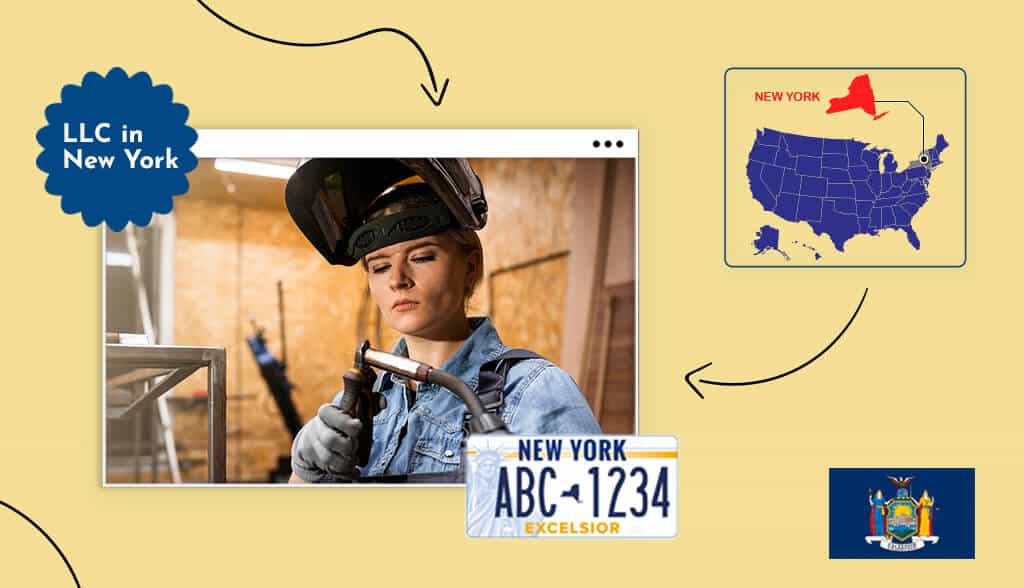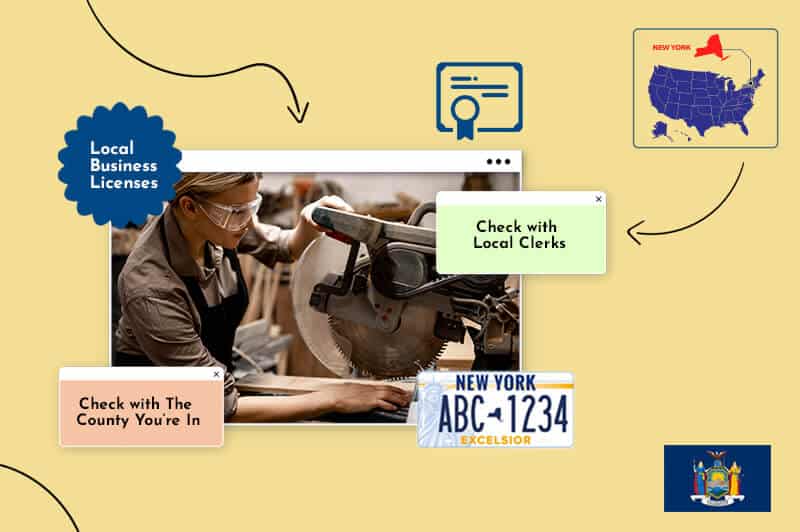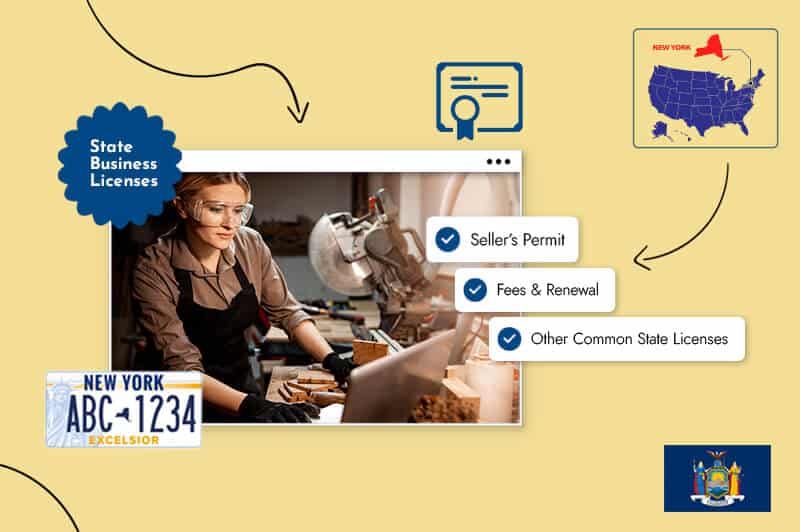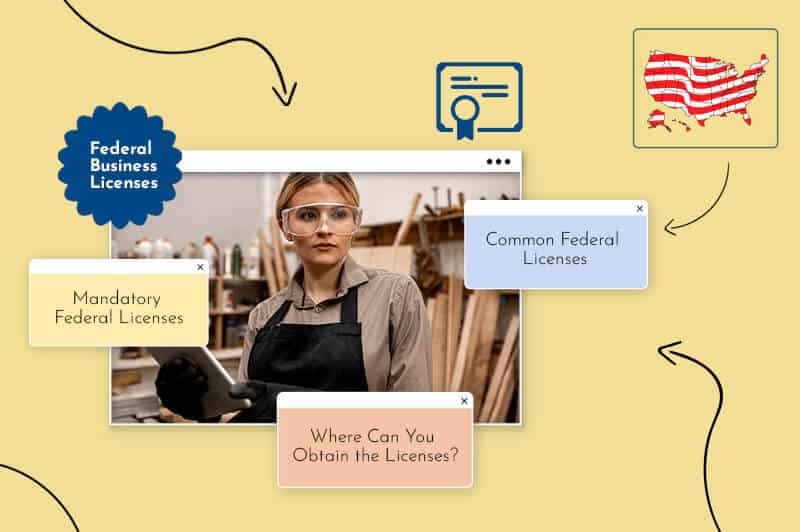
Whether you open a business in NY, or any other type of business structure, there are mandatory licenses and permits you might need. New York oversees business activity to keep the general public and others safe, and licensing is an essential component of the state’s oversight system. Many businesses operating within the state must be licensed.
Small businesses might need licenses and/or permits. Both are issued by government agencies and grant permissions, but there are subtle differences between the two.
Licenses generally grant businesses and people the ability to carry out actions otherwise prohibited. Only those who hold the license are allowed to carry out the action, and it’s expected that they adhere to any stipulations in how the action is carried out.
Permits generally grant businesses and people the opportunity to conduct specific activities. Permits are often restricted to a place and/or time and are different from licenses in this way.
Whereas a New York State license restricts activity to the state, this is due to the limitations of New York’s authority. A permit isn’t limited by the state’s authority but is rather restricted by the terms of the permit. The same concept holds true for local licenses and permits.
Driving is one of the most common state licenses, and it’s illustrative of this difference.
A driver’s license grants someone the ability to operate a motor vehicle on New York’s public roads, and truck drivers might get a CDL-A license that allows them to operate the heaviest trucks. Before a licensed driver can take a truck on a specific road, however, the driver might need a permit that’s specific to the truck, road, and time frame.
Licenses and permits are issued at all levels of government, and they’re issued by many government agencies.
Since each government and agency can issue licenses and permits, there isn’t one uniform way to apply for every license. There isn’t even one uniform list of all licenses that a business might need.
To ensure your small business is properly licensed, you must check with local, state, and federal agencies.
Failing to obtain a required license from any government agency with jurisdiction can result in severe consequences.
Depending on the specific license you failed to obtain, your business could potentially face financial penalties, liability risks, and possibly even criminal penalties. Jail time isn’t unheard of for certain licenses, and the resulting fines and lawsuits can cost many thousands of dollars (or more).
Additionally, your business will be at least temporarily shut down until the license issue is taken care of. The shutdown could be permanent in select circumstances.
Even if the licensing infraction isn’t severe enough to cost thousands and shutter your business, any licensing issue can have negative consequences for your business. A short-term pause in operations is inconvenient and can negatively impact production, customers, and revenue. The violation also can carry smaller financial penalties that still must be paid.

Both municipalities and counties may institute local business licensing requirements and almost all have permitting requirements.
Since each local government sets its own license and permit requirements, you should check with the local governments where your business operates to see whether any permits are required.
Municipalities of any size might have licensing and permitting requirements, and the best source for information on licenses is the local clerk.
Check with your city, town, or village clerk to see whether your business’s location or activities necessitate any licenses or permits. The clerk will also know how to apply for any required local permits (and they may personally handle your application).
If you’re unsure how to reach your local clerk, check the municipality’s website. The current clerk’s location, phone number, and name will likely be listed under “Departments” or a similar heading.
Counties can also set licensing and permitting requirements, and the best source for county-required permit information is the county clerk.
The New York State Association of Counties maintains a director of county clerks, where you can find the name, address, phone, and fax of your county clerk. They’ll be able to inform you of any applicable permitting requirements.
Your county clerk probably also knows how to contact your local municipality clerk too, if you’ve had trouble finding that clerk’s information.
While local licensing and permitting requirements vary by municipality and county, many have requirements for:
There are many other activities that might require a business license or permit. Be sure to check with your local and county clerk to find out what permits are required where your business is located.
New York City uniquely maintains a long list of licenses that businesses operating in the city might be required to obtain. The list can be filtered by type of regulation, industry, and other criteria. You can check the list for any licenses that might apply to your business.

Most businesses operating in New York State need at least one state license, and many businesses may need multiple licenses from the state.
Perhaps the most common state license or permit is the Seller’s Permit, which essentially functions as a license to sell tangible goods within the state. The permit is officially called a Certificate of Authority.
Your business will need a seller’s permit if the business intends to sell and/or lease products subject to New York State sales tax. The permit essentially grants your business authority to collect and remit sales tax.
You can apply for a Certificate of Authority (seller’s permit) online with the Department of Taxation and Finance.
More information is available from the Department of Taxation and Finance if you need further details.
A New York Certificate of Authority (seller’s permit) is valid for a maximum of three years, after which time it’s “renewable at the discretion of the Department of Taxation and Finance.” Most seller’s permits are renewed if there’s not been any major issue.
When the time comes, you can apply for renewal through Business Express. There is no fee for renewing.
Many businesses need licenses in addition to the Certificate of Authority. For example, New York commonly requires businesses in the following industries to secure certain licenses:
The Department of State has a sortable list of businesses that may need additional licenses. The list also details how to apply for each license listed.
The New York Office of the Professions oversees the many different professions that require a state license. However, these licenses are given to individuals—and you likely already have any professional license needed for your field. You probably wouldn’t be starting a business in a field requiring a professional license if you personally didn’t have said license and training.

The federal government has its own licensing requirements for various businesses. Most federal business licenses are overseen by specific government agencies.
There isn’t any one federal license that every business in the United States must have. However, certain industries generally come with federal licensing requirements. Obtaining a federal license isn’t optional if your business is required to have one.
You might need a federal business license if your business is in a regulated industry, such as agriculture, alcoholic beverages, aviation, firearms/ammunition/explosives, fish/wildlife, commercial fisheries, maritime transportation, mining/drilling, nuclear energy, television/radio broadcasting, and transportation/logistics. There are still other industries that have federal licensing requirements.
If your business falls into one of these industries, the best way to check licensing requirements is to contact the overseeing federal agency.
Licensing filing requirements vary by government agency and license type. You usually must provide some basic business information (e.g., business name, location, member names, member addresses, industry, etc.), and many licenses have an associated fee.
For additional licensing requirements, including how to submit the proper form(s), you should contact the local, state, or federal agency providing the license.
If you’re starting or already have a small business in New York, be sure it has all the licenses and permits required. Check for local permits, New York business licenses, and federal licenses that you might need, and apply for any that are required.
This portion of our website is for informational or educational purposes only. Tailor Brands is not a law firm, and the information on this website does not constitute legal advice. All statements, opinions, recommendations, and conclusions are solely the expression of the author and provided on an as-is basis. Accordingly, Tailor Brands is not responsible for the information and/or its accuracy or completeness. It also does not indicate any affiliation between Tailor Brands and any other brands, services or logos on this page.
Products
Resources
©2025 Copyright Tailor Brands